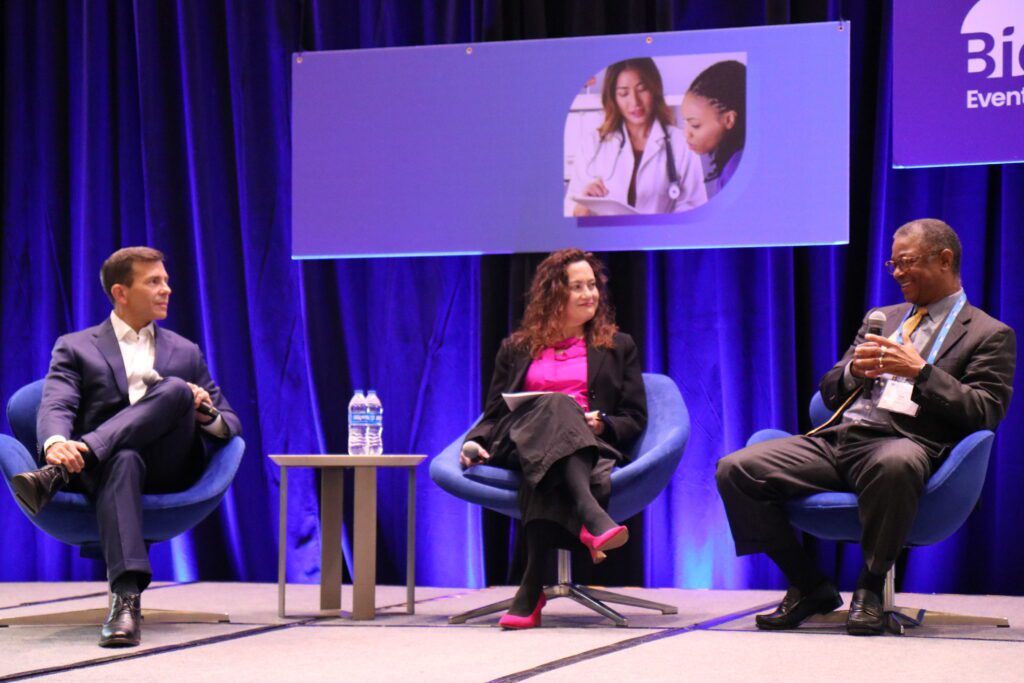“Patient advocacy is at heart of what BIO is working to accomplish within this community to extend the lives of patients,” said Rachel King, CEO of the Biotechnology Innovation Organization (BIO), kicking off the BIO Patient and Health Advocacy Summit on October 23 in Washington, D.C.
She recalled her first day on the job one year ago—at this very event, now in its 12th year. “BIO continues to work hard to establish the environment is in place to enable the work to be accomplished that supports innovation and leads to affordable access to patients,” she noted.
With patients at the center, BIO fights for policy that supports innovation, but also ensures patients have access to “the drugs that doctors feel are the right drugs for them.” In this vein, with the Inflation Reduction Act’s impact at the top of mind for the sector, King noted the ORPHAN Cures Act is an example of the kind of policy BIO is actively supporting.
Following King’s opening remarks, Michele Oshman, BIO’s VP of External Affairs, led a fireside chat with BIO’s Chair Dr. Ted W. Love and BIO’s Vice Chair John F. Crowley, Chairman and CEO of Amicus Therapeutics—both of whom embody this commitment to innovation and patients. They described their journeys to biotech—different routes that ultimately ended with the same focus on the patients.
Innovation ‘for every patient, regardless of resources’
Dr. Love led Global Blood Therapeutics, with the focus on finding a cure for sickle cell disease. GBT developed the first-ever pill targeting the underlying cause of sickle cell disease, rather than just the symptoms. The company was acquired by Pfizer last year.
He credits the patients for playing a role in helping to build the company and getting the intended drug across the finish line. Recalling his upbringing in segregated Alabama, he said the resource scarcity within his community drove his interest in patient advocacy. A big part of his approach today is in sharing why it is our responsibility “to provide every patient, regardless of resources, the access to the best treatment.”
His background also led him to focus on sickle cell disease. While a medical student at Yale, he was devastated to discover the disparities in treatment for sickle cell patients—and the racial discrimination that these primarily African American patients experienced. He was able to lend comfort, though at the time, he did not have the available resources to make a big difference. His opportunity to make a difference for sickle cell patients everywhere came when the opportunity at Global Blood Therapeutics drew him out of retirement from Genentech.
Meanwhile, Amicus was one of the companies that impressed him “in that it was all about the patient,” he said. “Their focus allows them to keep their attention on what matters most.”
The mission moment
John F. Crowley, a Navy combat veteran, got into biotech through two important patients: two of his children, who were diagnosed with Pompe disease, a rare genetic condition cause by improper glycogen storage within the body. He founded two biotech companies, Novazyme (later acquired by Genzyme) and Amicus Therapeutics, to develop better therapeutics and a cure for Pompe as well as other rare diseases.
“This was a balance between a race against time, understanding nature, moving science forward, and living their lives,” he said of his family’s experience (the inspiration for the film, Extraordinary Measures). “The purpose of spending time with the ones you love is the entire premise behind the mission at Amicus.”
Crowley adopted the concept of the “mission moment” while Chair of the Make-A-Wish Foundation, where each meeting started and ended with a mission moment. At Amicus, he begins his own meetings this way to focus on the purpose. He hopes to do the same within BIO and the Emerging Companies section to emphasize the unique contributions of the biotech industry.
Amicus believes not only in the highest quality treatment for people living with rare diseases, but also that this treatment is broadly accessible and fairly priced. For Amicus, said Crowley, patient advocacy is not a function but the core of who they are and what they do.
How centering patients leads to better treatments
Crowley asks each employee at Amicus to think as though they were the patient or the family member of a patient with a rare disease. What would they do? How would each decision be made?
This is how Amicus keeps the core value of those living with a disease at the center of what they do, especially when times are tough. And this is where the company culture becomes ingrained, and the practices are put in place.
What can patient advocates take away from this, especially as they seek to be the voice of patients on Capitol Hill?
The answer is in the purpose of BIO, said Dr. Love, which is “to be an advocate and protect the global environment for science and innovation. Our combined aim is to protect innovation and help clear the way for treatment equality, despite socioeconomic condition.”
“With smaller companies, share patient perspective, endpoints you think need to be measured, and your willingness to go to the [Food and Drug Administration] and have discussions about what the company needs to tackle to get these therapies approved,” continued Dr. Love. He acknowledges that getting rare disease drug approval can be challenging due to small population sizes, little science, and differing patient presentations, but this is where patients can help with regulatory challenges.
John F. Crowley added that being part of a company that advocates for patients “makes the business better, creating purpose. Becoming a part of these communities and developing deeper relationships allows for time saved and limited mistakes.”
“Overall, it is an essential part of a successful business,” he said.
Along with over 200 biotech entrepreneurs, John F. Crowley and Ted Love are “holding each other accountable and renewing their moral obligation to ensure equal access to therapies which can only be done when patients living with these diseases are included in the discussion and are their true partners in development.”




